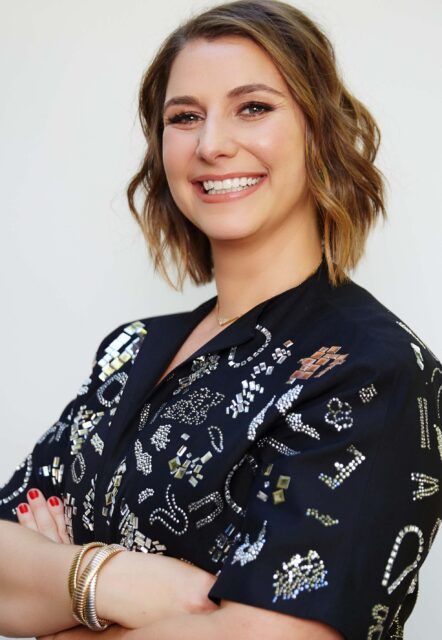
Emily Tisch Sussman ’08 is a family policy advocate, leading democratic political strategist and mother of three. She is Senior Advisor for Paid Leave U.S. and an advocate for how the policy supports families and businesses. Sussman has extensive experience guiding young activists, having previously served as executive director of Young Democrats of America, and as founder of Think Blue, an organization to increase youth participation in the democratic electoral process.
Tell us about yourself and how you got involved in podcasting.
I started podcasting after I had my second child and ultimately decided to leave my 15-year career in D.C. politics. After having my first child just a few days before the 2016 primary, trying to juggle my fast-paced career in DC and then having my second child I began to realize how unsustainable it had become. So, I pivoted into my first podcast, “Your Political Playlist,” which featured women experts and covered a variety of issues. I was honored to have the opportunity to interview some incredible women like Secretary Hillary Clinton, Speaker Nancy Pelosi, Stacey Abrams and more.
What inspired you to launch an all-women podcast?
Women have always been at the center of my work. When I launched “Your Political Playlist” I knew I wanted to feature all-women and really solidify them as the experts they are in their respective fields. I have done nearly 300 cable news appearances over the years and more often than not, men are positioned as leading experts in their field, leaving little room for women.
Now, with my new podcast, “She Pivots,” I again decided to feature all-women because I think the “pivot” has largely been experienced by women and largely experienced in silence. I know so many women who have had a pivotal life moment that really changed their career and life trajectory and I wanted to create a space to tell those stories and normalize the often complicated journey us women go through.
What was your “pivot?”
I think I’m still pivoting. But, it started after I left politics at the height of my career. I never thought I would leave D.C. or my political career, but having kids changed my perspective and forced me to pivot. I often joke that my kids killed my career, and I recently wrote about it, but really they helped me transition into this career in podcasting that I love. Now, I am continuing to pivot into my new show “She Pivots,” where I am constantly inspired by the stories and women around me.
What kind of guests should listeners expect?
We are going to have incredible women this season who have gone through a range of life events that I think everyone will find a connection to. I think you will laugh and cry and hopefully find the same inspiration I did when interviewing them.
Can you tell us about your journey to social work school and later law school?
I was always driven to help people, and what form it took evolved over time. My undergraduate degree is in social work, which gave me great satisfaction to work one-on-one with clients, but I was lacking scale of impact. I found that scale in law.
What were you involved in at Cardozo?
I started an organization while at Cardozo with another alum, Greg Propper ’07, called Think Blue. The idea behind Think Blue was that we would gather together our political power as young professionals to support young, congressional candidates, so that our support could have a national impact. Our starting board was made up of many of my friends from Cardozo including Eddie Huang ’08 and Lindsay Nathan ’08.
How has receiving your law degree impacted your career?
Being a lawyer gave me the analytical skills and confidence to tackle any political fight. I can step back to give a broad assessment of the landscape before creating a plan.
You are a family policy advocate. How did your J.D. in family law from Cardozo guide your work?
The legal obligations and benefits of the family structure have always been at the core of my work because it is such an important foundation in the United States legal system. Who we allow to be included into it dictates not only legal rights, but cultural status. Ensuring that everyone had a right to marriage was the beginning of my legal career, and ensuring that all parents have rights to properly and safely raise a family is where I have been heading in the last few years.
What do you hope is the impact of Pivot?
I hope women (and everyone!) will listen to the show and find inspiration. That they will listen and feel validated that maybe something they have gone through or will go through in the future is reflected in these stories.
